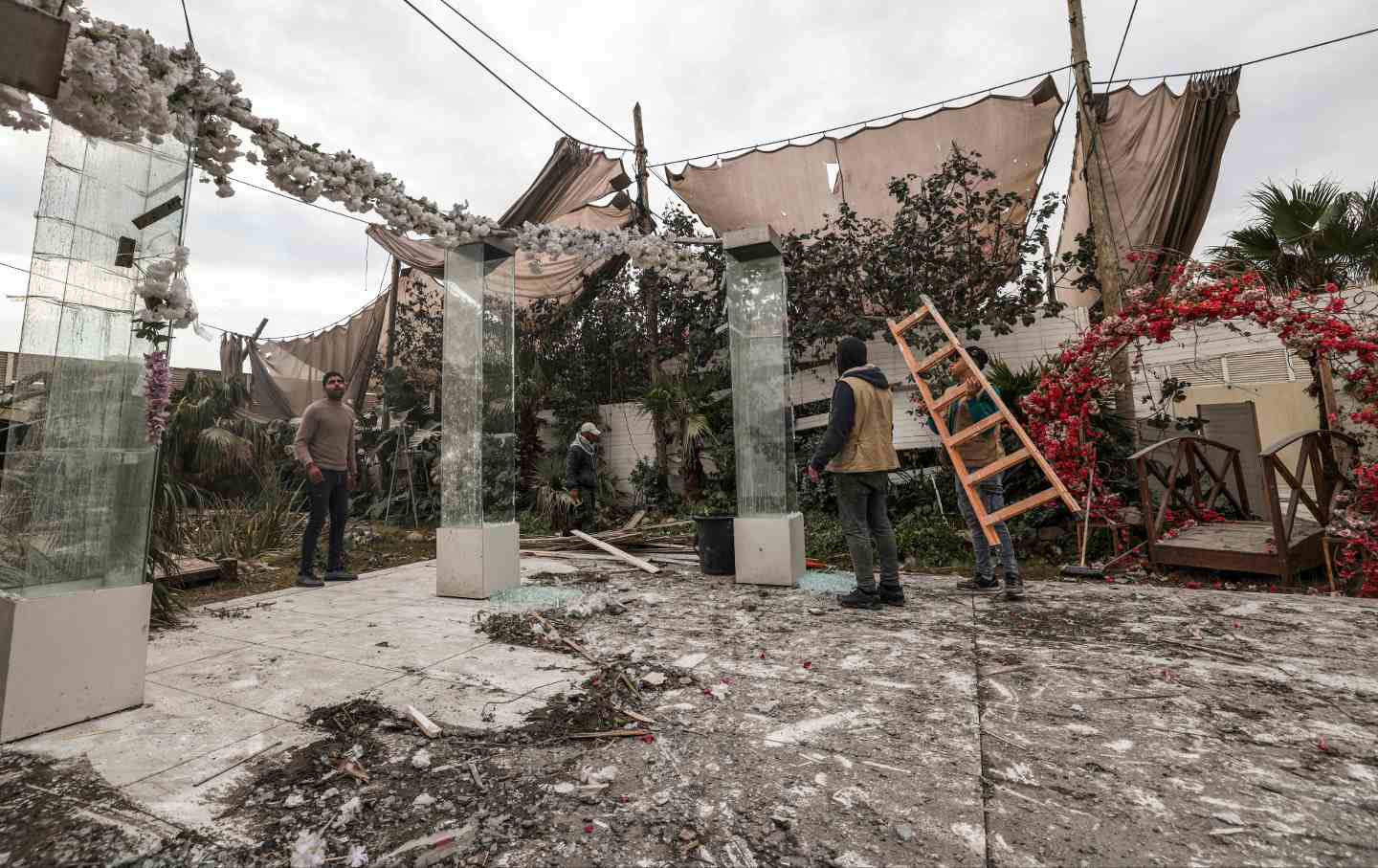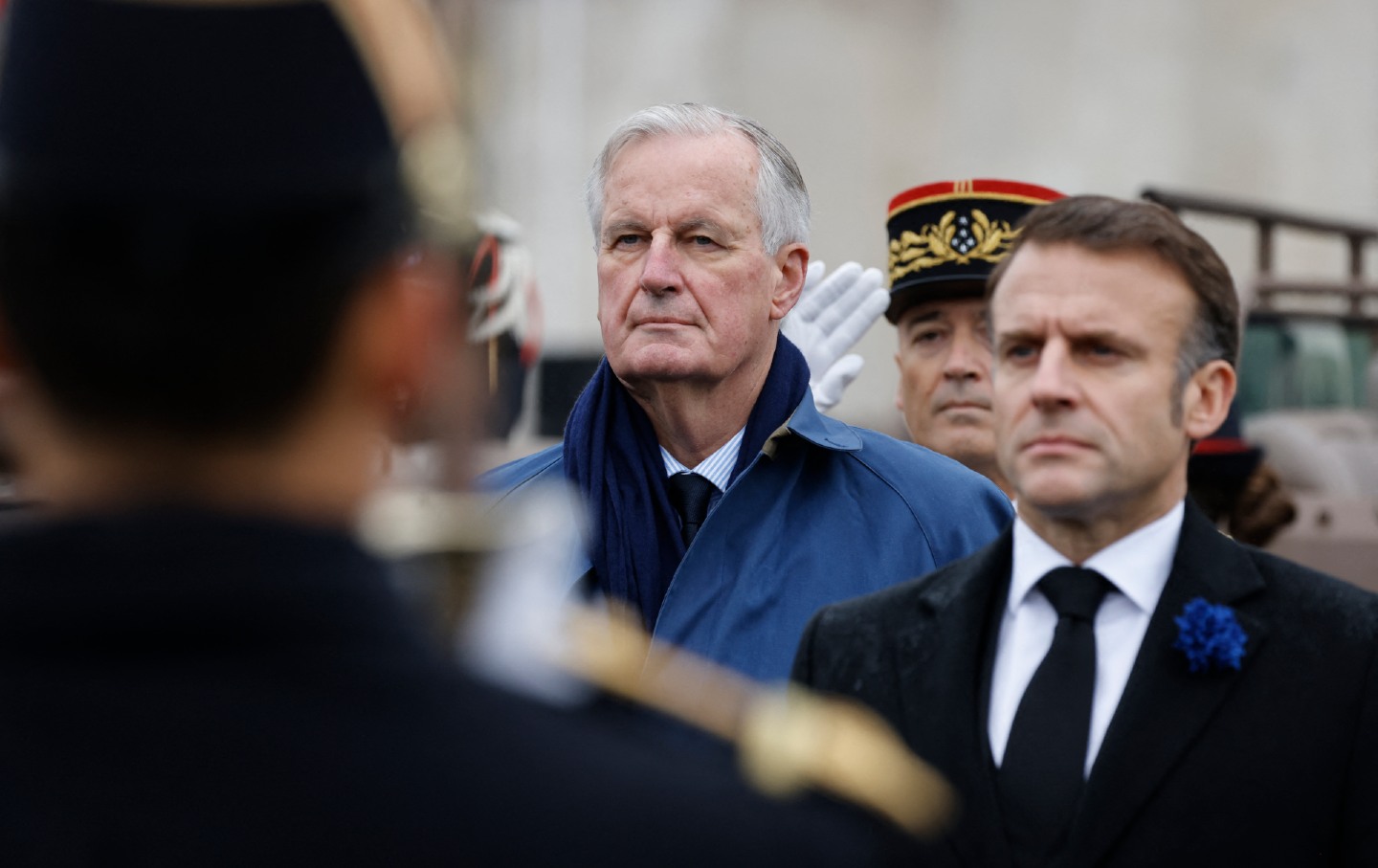I Was Blissfully Planning My Engagement Party. Then the Bombs Started Falling.
I had dreamed of a wedding and cute, chubby babies. But I live in Gaza. So now I just dream of surviving.

Palestinians inspect a damaged wedding photography studio following Israeli strikes in Gaza City on February 13, 2023.
(Mahmud Hams / AFP via Getty Images)My fiancé first saw me at work. I was overseeing a start-up event, and, though he was an emergency doctor, he was interested. He watched me flying around like a bee getting everything together, and then he became more interested. He met me and asked my then-manager if he thought it would be OK to ask me to marry him. (The answer: no.)
Three years later, life paved the way for us to meet, once again at work. “Your heels were the first thing I heard, and I knew I wanted to marry you.” Those were the first things he said to me after proposing.
I hadn’t been thinking of an arranged marriage. I lived abroad most of my life and had always imagined myself falling in love and having a grand proposal. But arranged marriages are common in Palestine, like in many places across the world. After he proposed, I asked my friends about him, and we talked, and I decided to say yes. He was very gentle and smart.
Then came our engagement period. Technically, this meant that we got legally married, since our culture deems that a must for us to be alone together without any judgment. But we still called it an engagement, and I still thought of him as my fiancé, because we hadn’t had a full wedding ceremony.
When the day came to sign our wedding papers, I was lost in a sea of bridal bliss, thinking of a dress to match my ring (I finally found a jade-colored dress with a beautiful shimmery look), and of makeup that was just the right shade of hope. My friend and I drowned out the world with wedding songs, our laughter a defiant stand against the shadows of aggression that are always waiting in Gaza.
My dad came to pick me up from our house in Gaza to go to Khan Younis to document our marriage and celebrate with the family. I felt like a true princess. The possibilities of the world felt endless as we made our way to what seemed like a brand-new life for me. On our way, Dad’s beautiful pieces of advice made my racing heart calm. He told me how I could turn our lives into heaven if I was wise enough.
After we got our papers sorted out, me and my fiancé returned to Gaza City for our first romantic dinner as a couple. We walked into the restaurant holding hands for the first time, and waves of emotions—anticipation, excitement, anxiousness, shyness—wrapped around me. There were candles lit on the tables. We had failed to collect our rings before going to Khan Younis, so instead we got them right before going to the restaurant, and he put the ring on my finger right there and then. It was magic, to be next to the beach, hearing the waves with beautiful music playing, under the dazzling sky of my beloved city, planning a life I envisioned full of love and laughter.
I had everything prepared for my engagement party. It would be at the Al Mathaf Hotel. My mom got herself a beautiful off-shoulder black dress while I chose a plum-colored French gown for the big night. I had to run from one hairdresser to the other before finally finding one that wasn’t fully booked on the day I chose for the party. That day was Thursday, October 12, 2023.
Life in Gaza is a cruel game of contrasts. As the Israeli bombs began raining down on us that first week after October 7, my dreams were suddenly on hold, replaced by a more basic desire: to survive.
I wound up using the Al Mathaf Hotel not as a party spot but as an evacuation site, sheltering from the endless air strikes in the same place where I had imagined I would mark one of the happiest moments of my life. Even while the air strikes were happening, I still hoped that maybe, just maybe, it could all end before Thursday and we would still have the party.
Of course, we never had the party. The hotel has now been destroyed.
“I am so sorry you have to go through all of this. I don’t know where this was hidden for us, our whole lives have come crashing down,” my fiancé wrote to me a few days after the aggression started, apologizing for something that wasn’t his fault, for something that he was also struggling with.
Since then, my days have been a surreal blend of fear and longing. Conversations with my fiancé now hang heavy with despair. Our dreams of a wedding, once vivid and vibrant, have been buried under the rubble.
Those days, we barely talk; when we do, our conversations are stiff and cold. Both of us speak while our minds are completely elsewhere. Both of us are still traumatized by what we have had to live through. We haven’t been able to meet once since the war started.
Popular
“swipe left below to view more authors”Swipe →I can’t even think of what life would look like tomorrow, let alone about having a wedding or a family. I used to get a million scenarios running through my mind about the things I wanted for my wedding or the life I wanted to have with a loving husband and cute, chubby babies. Now, not a single thought comes to my mind about this other than the fact that I could lose him and that if I had kids, they would have to live in these terrible conditions. When I think of marriage now I think, “Do I still want to get married?” I remain unsure.
I still can’t believe how running from one shop to another for a dress turned into running from one place to another to escape death. I come across pictures on the Internet that show the shops I wandered looking for my dress, the venue I had planned to hold the party in, and the streets I walked through with my fiancé. They have all been destroyed, all turned into one with the ground. How can this be the story I tell my kids about how I and their father met and got married? What a miserable, miserable engagement!
Each night, as I try to close my eyes, my mind races with haunting visions—losing my family, the horrors of Israel’s assault. Sleep, when it comes, brings no comfort, as it is often fractured by nightmares too harrowing to describe.
In the heart of this storm, I often feel invisible, my existence a mere whisper against the roar of these horrors. It’s a strange feeling, being as human as anyone else, yet fighting to remind the world that I, too, breathe the same air, dream the same dreams, and yearn for a life defined not by fear, but by love.
More from The Nation

The Fall of Syria Changes Everything The Fall of Syria Changes Everything
Retired diplomat Chas Freeman and writer Pascal Lottaz discuss what happens now that Damascus is in the hands of Hayat Tahrir al-Sham.

Netanyahu Must Be Brought to Justice. But We Can’t Stop There. Netanyahu Must Be Brought to Justice. But We Can’t Stop There.
This genocide is a massive criminal undertaking, and we must hold as many of its perpetrators accountable as we can.

My Brother Chef Mahmoud Almadhoun Died Because He Fed Gaza’s Starving Citizens My Brother Chef Mahmoud Almadhoun Died Because He Fed Gaza’s Starving Citizens
His killing by Israel sent a chilling message that no one is safe, including humanitarians who stand in the way of Gaza’s erasure.

The Underground Network Helping Gazan Refugees Survive in Egypt The Underground Network Helping Gazan Refugees Survive in Egypt
A patchwork of volunteer-run mutual aid organizations has sprung up to tackle the severe problems facing people fleeing genocide.

The Dangers of Trump’s Foreign Policy The Dangers of Trump’s Foreign Policy
Strategic incoherence and factionalism reign.

Macronism Has Died a Second Death Macronism Has Died a Second Death
The French parliament votes to oust the government.


